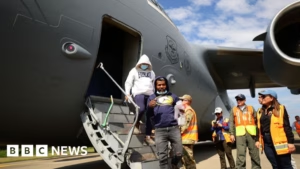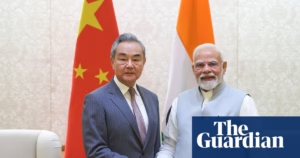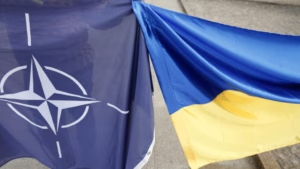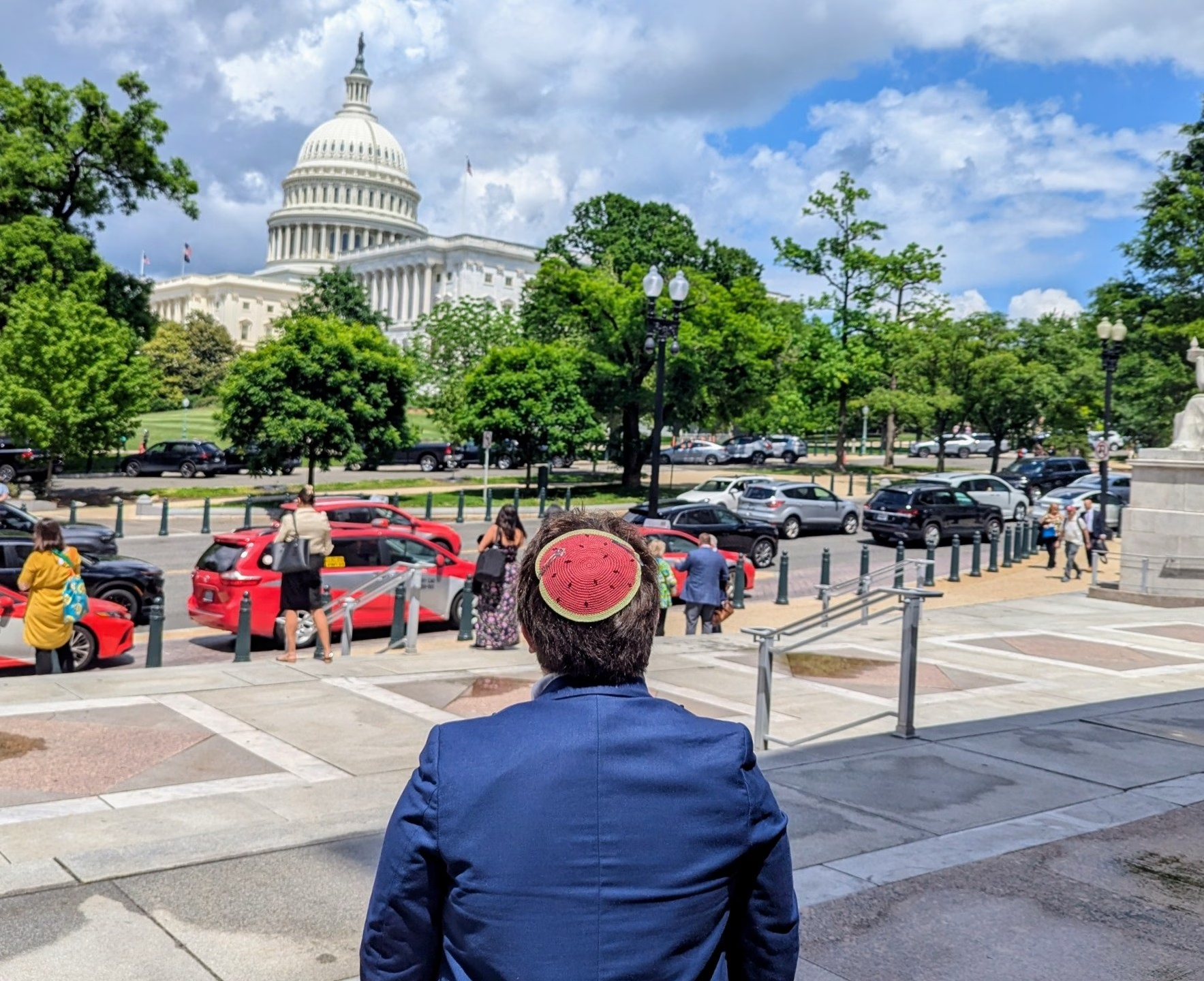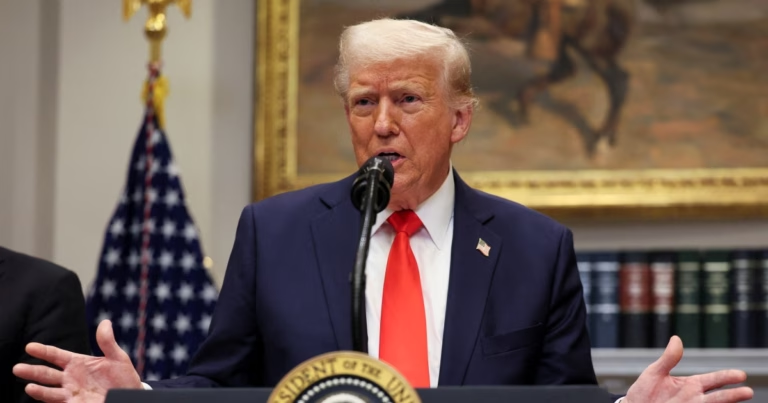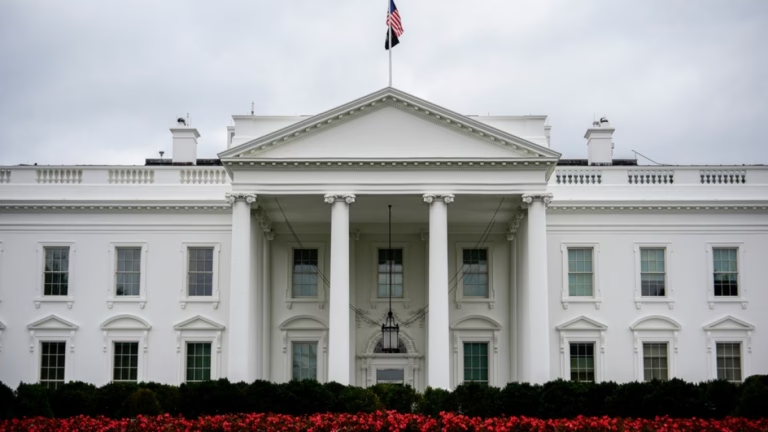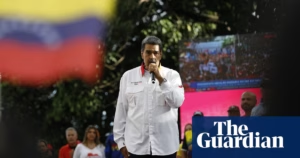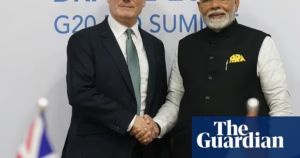On Tuesday, a group of Jewish student activists met with members of the United States Congress in Washington, DC, to tell their stories, which they say have been left out of mainstream narratives about anti-Semitism on college campuses.
As student protests against Israel’s war in Gaza swept the country last year, Columbia University in New York became a flashpoint.
The university saw one of the first student encampments in the country, erected to demand an end to investments in companies complicit in human rights abuses. Shortly after the tents started popping up, the campus also witnessed some of the first mass arrests of student protesters in the Palestinian solidarity movement.
That visibility has made Columbia a focal point for President Donald Trump’s efforts to crack down on what he called “illegal protests” and campus anti-Semitism.
Earlier this year, Columbia student Mahmoud Khalil became the first student activist to be detained by the Trump administration and targeted for deportation.
Tuesday’s delegation of Jewish students came to Congress to push the case that Khalil and others like him should never have been detained in their name. They met with at least 17 Democratic legislators from both the House of Representatives and the Senate.
The students involved in the lobbying day, organised by Jewish Voice for Peace Action, an advocacy organisation, told Al Jazeera about their experiences:
Tali Beckwith-Cohen
Raised in upstate New York, history major Tali Beckwith-Cohen grew up in a community where Zionism was the norm. She remembers being told “myths” about Palestine as “a land without a people for a people without a land”: a slogan used to justify the establishment of Israel.
But as she began to learn Palestinian history and meet Palestinians, Beckwith-Cohen said her beliefs were challenged.
Eventually, after the war in Gaza began in October 2023, she became involved in Palestinian rights activism.
Human rights groups and United Nations experts have found evidence that Israel’s tactics in Gaza are “consistent with genocide”. More than 52,615 Palestinians have been killed in the conflict so far.
“For a long time, I had this kind of feeling of discomfort, this feeling of wrestling, this feeling of maybe cognitive dissonance, and how can I reckon these values I hold dear with Zionism?” Beckwith-Cohen told Al Jazeera.
“We are seeing the bombing, the disregard for human life, for children, for hospitals, for schools. It forced me to make a choice.”
She stressed that the protests were spaces of solidarity, where students of all backgrounds were committed to the idea that their safety is intertwined.
Confessing that the media narrative of what’s happening on the Columbia campus was disingenuous, Beckwith-Cohen stated, “We’re here today to tell our Congress people that what we’re seeing on campus is clearly an authoritarian, fascist crackdown on all dissent, not only students peacefully advocating for an end to genocide.”
Carly Shaffer
When Carly Shaffer voiced concern about the Israeli escalation in Gaza on a university WhatsApp chat, some of her fellow students questioned her Judaism.
Out of the hundreds of people on the chat, she remembers that Khalil – the activist arrested for deportation – was the only person who contacted her directly to reject the comments she was subjected to.
As she got to know Khalil, she came to view him as the “embodiment” of someone who cared about the safety of all students on campus.
Shaffer told Al Jazeera that she felt “sick” and “horrified” when Khalil was arrested. Her discomfort was then compounded when she saw that the Trump White House celebrated his detention on social media.
Pursuing a master’s degree in human rights and social policy, Shaffer views speaking out against injustice – including in Palestine – as a practice rooted in her Jewish faith.
“The Columbia protest movement, it’s a movement of love. It’s a movement of solidarity,” Shaffer said. “And Jewish students are also integral and crucial to this movement.”
Highlighting the effort of Jewish student protesters to learn and celebrate their traditions with their peers from the encampment, she decried the “weaponisation of anti-Semitism”, saying that the issue is being used to shut down conversations about Israeli atrocities in Gaza.
“Jewish students are being used as pawns in Trump’s political agenda,” she said. “And the weaponisation of anti-Semitism to dismantle this movement is not just a threat to Jewish students; it’s a threat to all of us. That’s why it is so important for us as Jewish students to directly correct this false narrative.”
Sarah Borus
Barnard College student Sarah Borus, who was arrested during the crackdown on the Columbia encampment, said she grew up in an anti-Zionist family in a “very Zionist community”.
She felt it was important for Jewish students like herself to convey their experiences directly to the people in power in Washington, DC.
Borus said, “We’re talking to members of Congress to tell them our stories that are left out of mainstream news.”
Citing that Trump’s mission is not about protecting Jewish students but about using fears of anti-Semitism to target non-citizen student activists and academic freedom, Borus affirmed that despite her fear, she stands by the choices she has made.
Shay Orentlicher
Shay Orentlicher, who uses the pronoun “they”, said that despite the oppression, suffering, and despair that they faced, they believe that Columbia’s demonstrations helped raise awareness nationwide.
Orentlicherweise, who has no regrets about participating in Columbia University’s encampments, stated the importance of standing up for Palestinians and acknowledged that the protests shifted the public discourse in a significant way.
Raphie
Raphie, who chose to identify by his first name only, said he grew up “very Zionist”. But as he learned more about the conflict between Israelis and Palestinians, he felt he had been deceived.
Raphie, who is studying mathematics, said the war on Gaza, the campus protests and the backlash the student protesters faced all made him feel a “personal responsibility to fight for what is right”.
He stressed that the real suffering is happening in Gaza, pointing out that every university in Gaza has been destroyed and students there haven’t had food for 60 days.
